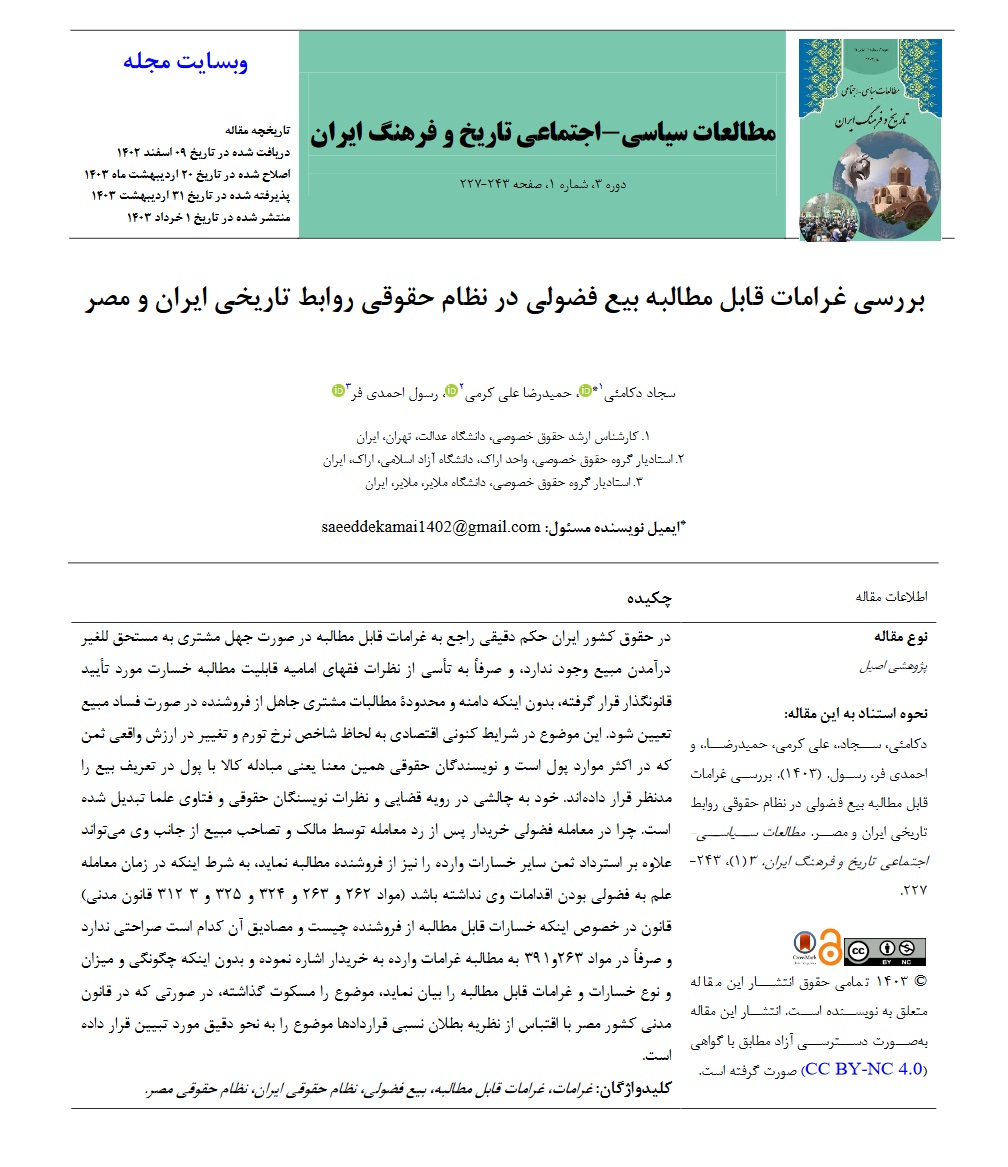Examination of Recoverable Damages in Unauthorized Sales in the Legal Systems of Iran and Egypt
Keywords:
Damages, Recoverable Damages, Unauthorized Sale, Iranian Legal System, Egyptian Legal SystemAbstract
In the legal system of Iran, there is no precise ruling regarding the recoverable damages when the buyer is unaware that the sold item belongs to someone else. The legislator, merely following the opinions of Imamiyyah jurists, has affirmed the possibility of claiming damages without defining the scope and limits of the ignorant buyer's claims from the seller in the event of the invalidity of the sale. This issue has become a challenge in the current economic conditions, considering the inflation rate index and the change in the real value of the price, which, in most cases, is money. Legal scholars have also considered this, meaning the exchange of goods for money in the definition of a sale. The issue has become a point of contention in judicial practice, legal scholars' opinions, and religious decrees. In an unauthorized sale, if the original owner rejects the transaction and takes possession of the sold item, the buyer can demand not only the return of the price but also compensation for other damages from the seller, provided that they were unaware of the unauthorized nature of the transaction at the time (Articles 262, 263, 324, 325, and 312 of the Civil Code). The law is not explicit about what recoverable damages from the seller are and what constitutes them. It only refers to the buyer's right to claim damages in Articles 263 and 391 without specifying the type, amount, or manner of recoverable damages, leaving the matter unaddressed. In contrast, the Egyptian Civil Code, drawing from the theory of relative nullity of contracts, has precisely clarified this issue.
Downloads
References
Abu Masoud, R. M. (2010). Explanation of the Civil Law: Named Contracts of Sale, Exchange, Lease, and Insurance (1st ed.). Al-Halabi Legal Publishing.
Alavi Qazvini, S. A., & Masoudian Zadeh, S. Z. (2014). The Rule "He Who Gains Must Bear the Loss". Journal of Legal Thought Research,, 1(4).
Ansari, A. (2011). Collection of Delayed Payment Damages in Banking Contracts. Islamic Economics Quarterly,(42).
Ansari, M., & Taheri, M. A. (2009). Encyclopedia of Private Law (3rd ed.). Jungle Publishing.
Bahrani, S. H. (2017). Al-Burhan fi Tafsir al-Quran (2nd ed.). Dhul-Qarnayn Publishing.
Emami, H. (2022). Civil Law (60th ed.). Eslamiyeh Publishing.
Ibn Manzur, M. M. (1993). Lisan al-Arab (3rd ed.). Dar al-Fikr for Printing and Publishing.
Isfahani, M. H. (1998). Hashiyah on Makasib (1st ed.). Ilmi Publishing.
Jafari Langeroudi, M. J. (2017). Obligations Law (4th ed.). Ganj Danesh Publishing.
Karimi, A., Rad, S., Elham, T. Z., & Ebrahim. (2001). Tortious Liability of Unusual Proximities in Iranian and French Law. Journal of Islamic Legal and Jurisprudential Studies, 11(21).
Katouzian, N. (2017). Obligations Outside of Contracts: Tortious Liability, Civil Responsibility, Usurpation, and Restitution (8th ed.). University of Tehran Press.
Khadem Sarbakhsh, M., & Soltani Nejad, H. (2013). The Principle of Compensation for All Damages, Journal of Islamic Legal Foundations and Islamic Rights. In.
Khoda Bakhshi, A. (2014). Distinction Between Civil Law and Criminal Law (3rd ed.). Majd Publishing.
Khwansari, A. (1985). Jam' al-Madarik fi Sharh Mukhtasar al-Nafi (2nd ed., Vol. 3). Offset Printing.
Mousavi Khomeini, R. (2012). Kitab al-Bay (3rd ed.). Islamic Publications Office.
Qasim, M. H. (2008). Civil Law - Named Contracts: Sale, Insurance, Lease, Comparative Study (1st ed.). Al-Halabi Legal Publishing.
Safai, H., & Rahimi, H. (2014). Civil Responsibility: Obligations Outside of Contracts (6th ed.). SAMT Publishing.
Safai, S. H. (2014). General Rules of Contracts (32nd ed.). Mizan Publishing.
Tabrizi Subhani, J. (1999). Ahkam al-Bay' fi al-Shari'ah al-Islamiyyah al-Gharaa (1st ed.). Imam Sadiq Institute.

Downloads
Published
Submitted
Revised
Accepted
Issue
Section
License
Copyright (c) 2024 سجاد دکامئی, حمیدرضا علی کرمی, رسول احمدی فر (نویسنده)

This work is licensed under a Creative Commons Attribution-NonCommercial 4.0 International License.







